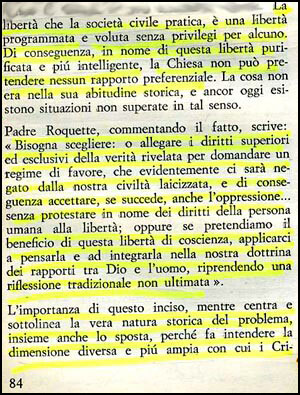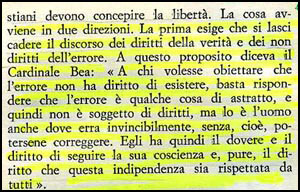 |
Documents for your files

PROGRESSIVIST DOCUMENT OF THE WEEK
Fr. Pattaro: The Church Renounced the Right of Truth in Her Relation with the State
Fr. Germano Pattaro was a professor at the Patriarchal Seminary of Venice and member of the Secretariat for Ecumenical Activity in Italy. In a book reproducing lectures he delivered on Vatican Radio, he offers a quite lucid overview of the option the Catholic Church took to adapt herself to the Modern State after the Council. She renounced her claim to the right for the truth and accepted becoming one religion along with others in their error.
At right, the cover of Reflections on the Post-Conciliar Theology (Riflessioni sulla teologia post-conciliare). Below right, the Italian text; below left, our translation.
The liberty practiced by civil society is a planned and desired liberty without privileges for anyone. Consequently, in the name of this purified and more intelligent liberty, the Church cannot pretend to have any preferential relationship [with the State]...
Commenting on this fact, Fr. Roquette writes: "We have to choose: we must either ask for a regime of favor based on the superior and exclusive rights of the revealed truth, which obviously will be denied by our laicized civilization ... or- if we want to have the benefits of this liberty of conscience - we must make an effort to rethink the topic and integrate it into our doctrine regarding relations between God and man, considering the traditional reflection as not finished."
The above paragraph is significant because it focuses on and stresses the actual historic nature of the problem, and at the same time moves it forward, because it makes us understand the different and broader dimension in which Christians must conceive liberty.
It moves in two directions: First, it demands that we abandon the exposition that the truth has rights and the error has none. On this matter, Cardinal Bea said:
"To anyone who wants to object that error has no right to exist, it suffices to answer that error is an abstract thing and, therefore, is not subject to rights; man, however, is subject to rights, even when he errs invincibly, i.e, when he cannot be corrected. He has, therefore, the duty and the right to follow his conscience and, furthermore, he has the right to have this independence respected by all."
(Germano Pattaro, Riflessioni sulla teologia post-conciliare, Rome: A.V.E., 1970, pp. 84-85)
|



|
|

Posted on September 22, 2012

Related Topics of Interest
 Liberty of Conscience: A 'Delirium' Liberty of Conscience: A 'Delirium'
 Religious Liberty, a 'Monstrous Right' Religious Liberty, a 'Monstrous Right'
 When Liberty Becomes an Evil When Liberty Becomes an Evil
 Vatican II's Position on Human Dignity Vatican II's Position on Human Dignity
 At Lourdes Pope Bows to Liberty, Equality, Fraternity At Lourdes Pope Bows to Liberty, Equality, Fraternity
 Vatican II Turnaround on the Church-State Relationship Vatican II Turnaround on the Church-State Relationship
 The State Must Be Subordinate to the Church The State Must Be Subordinate to the Church

Related Works of Interest
|
|
Documents | Home | Books | CDs | Search | Contact Us | Donate

© 2002- Tradition in Action, Inc. All Rights Reserved
|
 |
|
